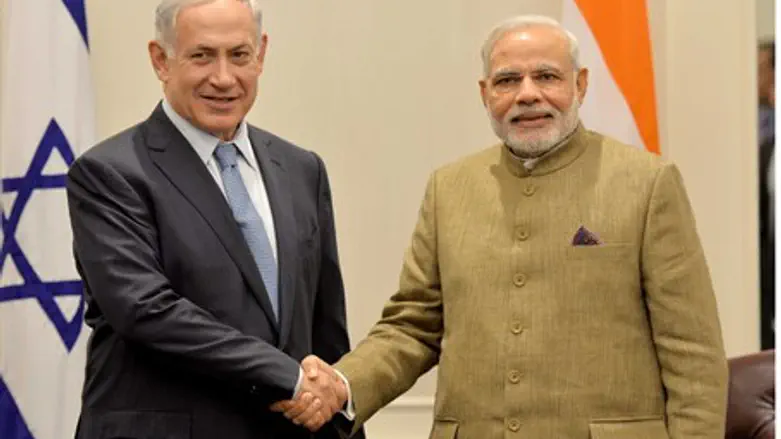
Israel and India are finally coming out in the open: with the election of Prime Minister Narendra Modi of the Bharatiya Janata Party, India has outwardly expressed its desire to expand the relationship between itself and the Jewish State.
Arutz Sheva spoke with an expert on Israel-India ties to understand why those ties have only begun to expand in the last few years, and why they seemed to expand exponentially this last year on the background of a complicated history between the two countries that was never the fault of Israel.
"From an intellectual standpoint the Indian intelligentsia had to reject Israel simply because it was a 'Jewish' state," says Mark Sloman, former Director of the India Program at The Israel Project (TIP). "(Mahatma) Gandhi was unwilling to accept that India and Pakistan should split because of religious reasons."
As Sloman noted, Gandhi showed unwillingness to accept that India and Pakistan had split because religious differences had made problems between Hindus and Muslims irreconcilable.
It became a philosophical point of departure for Gandhi's Congress Party, which saw Israel's "Jewishness" as an anathema.
But that was only the start of the traditional split. India was the largest country in the Non-Aligned Movement during the Cold War. As a result, New Delhi became close with Arab states and became more accustomed to their political positions. Many analysts also point to India's Muslim minority of 100 million as influencing Indian foreign policy.
"It might have been a part of it, but it's not as big a factor as people have liked to make of it," commented Sloman. He added that regarding the conflict with the Palestinian Arabs, India has also been "more 'pro-Palestinian' than 'anti-Israeli.'"
India has few open enemies in the world, with Pakistan being the obvious exception. India has viewed its own role in the world, even prior to its recent economic gains, as primarily neutral.
Even as its ambitions grow for global influence, New Delhi is not looking to take sides says Sloan, who notes "India, partly because of Hindu influence and partly because of British influence, wants the respect and clout that comes with being a world power. But it doesn't want the responsibility."
On the subject of trying to gain more of a role specifically in the Middle East, Sloman said "they have so much going on in their own region" that they were not interested getting tangled up elsewhere.
India's assertiveness might come in to play when it makes clear to countries with hostile relations that they will not take sides and choose to maintain cordial relationships with both players.
This comes up between Iran and Israel. Though Israel would obviously love if New Delhi cut Tehran off, India is still a primary energy customer for Tehran. In fact, Indians might not understand why the Israeli-Iranian conflict even exists.
The Lion and the Tiger
Defense cooperation is the main beneficiary of the more outward ties between Israel and India.
"In the long run it will be Israeli intelligence and training. In the short term it's hardware," says Sloman, who worked several years in the US Departments of Defense and State advising on Middle East and Balkans policy. He also points out that there are some honeymoon elements to the relationship that Israel should bear in mind.
"I say short-term because if the United States takes notice, they will realize how huge a market India is. American companies could undercut Israeli prices. At that point, Israel would find itself second to the US."
When asked if India's neutrality on Iran meant Israel would be doing most of the intelligence sharing, Sloman said yes, but he also said that it would not be a one-for-one trade on intelligence that India contributed to the bilateral relations.
"That's okay because Israel needs a friend in a state the size of and with the influence of India. Warm, open and friendly relations with them are worth their weight in gold. India is seen as a leader of those countries that don't fit neatly into anyone else's club. Considering it used to be the forefront of the Palestinian cause, to move closer and closer to Israel is huge."
Economics
The real difference-maker - besides the new Prime Minister - has been India's eagerness to reach new markets says Sloman, who spent years scouting out Indian partners for American businesses. Over the last 20 years, India has developed a massive new middle class, and Israel for its part is a technological superpower.
"There isn't a farm in India that isn't using Israeli irrigation tech," says Sloman. "Israeli technology across the board is driving India's economic development."
On the issue that the two countries have been negotiating a free-trade agreement (FTA) for several years already, he says that Israel has a "very isolationist import policy that taxes imports heavily."
Sloman thinks Israel's government is afraid that Indian imports would be overwhelming for the economy, noting "India would still like to see the Israeli market open up more. The country still has a majority of people living in poverty."
"That growth will only continue as long as they find more markets," he says.